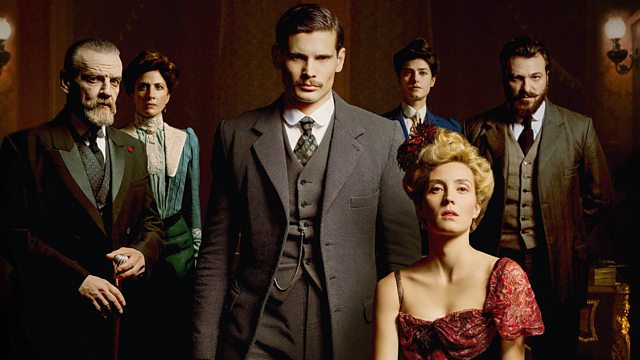Paris Police 1900; Season 1, Episode 4
Episode 103 gave viewers a bit of a respite from the bombardment of racism and misogyny that permeated the first two episodes to dive into some character development. Episode 104 builds upon that strategy. The show is really starting to give depth to characters like Jeanne Chauvin (Eugenie Derouand) and Joseph Fiersi (Thibaut Evrard). Marc Barbé, who plays, Le préfet Lépine, really shines in this episode. The show is sacrificing pace to accomplish all of this character development, and that makes the series feel a bit tedious at times. However, the Paris that the showrunners have created feels like a powder keg that is on the verge of exploding spectacularly, so I’m willing to be patient and see where the story goes.
Moreover, characters like Fiersi, Chauvin, and, especially, Lépine offer doses of earnest emotion that were missing from the first three episodes.
Fiersi has been an intriguing character from the beginning of the series, but the show’s writers tease quite a bit of depth to his character in this episode. Watching him chastise his children for imitating the thug that Puybaraud (Patrick D’assumçao) often orders him to be feels salient. It suggests an inner turmoil that must be eating away at him and that actually manifests itself near the end of the episode. The mystery of the origin of that inner turmoil is enhanced by the odd concern and compassion that he shows for prostitutes, which is in stark contrast to the coldness he’s been showing his wife every time she speaks. It’s all very curious. It feels like a good guy is lurking inside of Fiersi. A good guy that just can’t get out because the world that he operates in has irrevocably hardened his exterior.
The writers also give us more insight into the character of Jeanne Chauvin. She is another character whose rough exterior feels like a result of operating in a cruel world. Episode 103 makes it clear why Chauvin resents the French patriarchy, but episode 104 provides a character bombshell that some viewers may miss: She’s a Christian. She’s a Christian woman, working as a lawyer, for a Jewish mentor in a xenophobic, misogynist world! Talk about resiliency!! I found this to be the most riveting part of the episode because it speaks to the power of marginalized people banding together to resist hate regardless of religious observance. I suggested that episode 102 set up Meg Steinheil (Évelyne Brochu) and Antoine Jouin (Jérémie Laheurte) to be the show’s eventual heroes, but Chauvin’s emotional fortitude feels genuinely heroic in episode 104 and may allow her to pick that mantle later in the series.
I mentioned earlier, in this review, that Le préfet Lépine really shines in this episode. He shines because he shows us a moment of genuine vulnerability. His wife, her addiction specifically, is really putting him through the wringer. The narrative of their marriage has felt very sterile so far, but Lépine shows us that love and patience has kept this marriage together. The stoicism that he has been showing all series long is impressive, but seeing his humanity for a few scenes is refreshing.
With all of that being said, I’m somewhat confused about how the show is using Antoine Jouin (Jérémie Laheurte). He is the ostensible lead character of the show, but the last two episodes have really minimized his role. He played second fiddle to Chauvin in episode 103 and is outshined by both Fiersi and Lépine in episode 104. He’s really starting to feel like a bit player at best and an ineffectual character at worst. I’ll continue to be patient with him though.
I’ll continue to be patient, in part, because there is so much about the show that I find interesting besides the characters and the story. The set and costume designs have been on point in every episode so far. The streets are filthy, and I love it. Public sanitation was a fledgling enterprise at the start of the 20th century, and I appreciate the show’s commitment to making that evident. The dark suits that most of the actors wear are an effective tool to convey the specter of darkness that is looming over the city during this period. The emerging prescence of phones, bicycles, and candles makes the show wistfully nostalgic. Whenever the pace or the story seem to falter, it’s nice to be able to enjoy another aspect of the show until they pick back up. All of this gives me a reason to look forward to episode 5!

